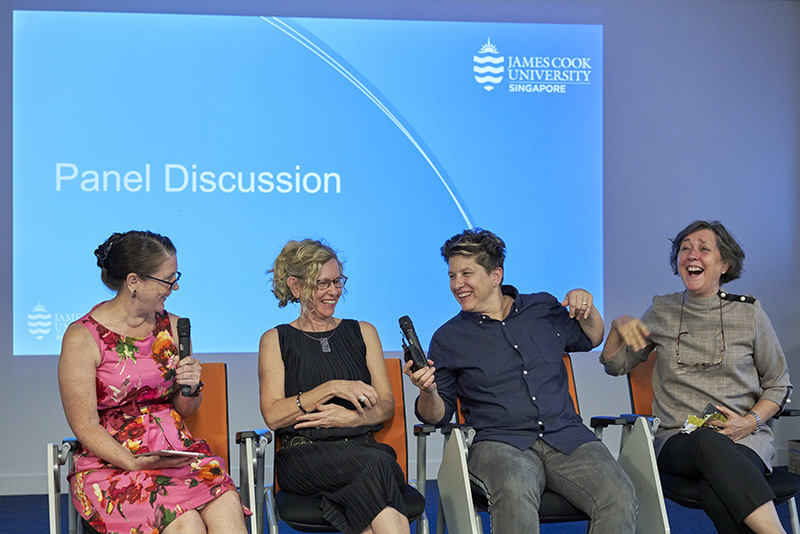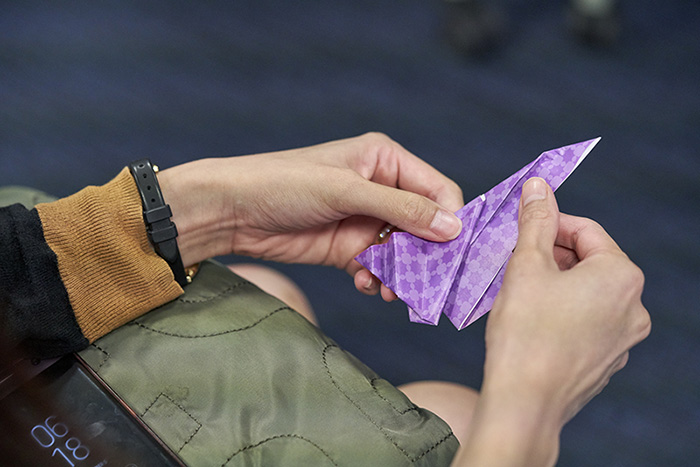Media Releases
Creativity at play in Singapore and Australia
Media Releases
This panel discussion provided a deeper understanding of creativity, and how we can nurture it.
On 5 December 2019, as the year winds to a close, a panel discussion was held in the Singapore campus of James Cook University on the subject of creativity. After all, what better way to embark on a new decade than with new and imaginative ideas?
 (From left to right: Dr Denise Dillon, ADRE & Senior Lecturer Psychology at James Cook University in Singapore; Dr Louise Gwenneth Phillips SFHEA, Associate Professor in Education at James Cook University in Singapore; Dr Anne Harris, Principal Research Fellow and Associate Professor, RMIT University (Melbourne, Aus); and Dr Esther Joosa, Arts Education Consultant / Director of Pedagogy Playeum)
(From left to right: Dr Denise Dillon, ADRE & Senior Lecturer Psychology at James Cook University in Singapore; Dr Louise Gwenneth Phillips SFHEA, Associate Professor in Education at James Cook University in Singapore; Dr Anne Harris, Principal Research Fellow and Associate Professor, RMIT University (Melbourne, Aus); and Dr Esther Joosa, Arts Education Consultant / Director of Pedagogy Playeum)
As Dr Denise Dillon, Associate Dean Of Research and Research Education (ADRE) & Senior Lecturer Psychology at James Cook University in Singapore, explains in her introductory address, “Creativity is widely recognised as essential for the ongoing progression of contemporary societies. This is illustrated by the World Economic Forum ranking creativity as a skill of increasing importance and an IBM study of 1500 CEOs that has identified creativity as the most important skill for leaders.”
She adds, “Yet creativity is often understood as quite an ambiguous concept that is out of reach for many.”
Therefore, we need to ask ourselves: What is creativity, and how do we nurture it, particularly in Singapore and Australian contexts?
Moderated by Dr Dillon, the panel discussion saw a distinguished group of speakers share their research and insights into creativity.
The panellists:
- Associate Professor Anne Harris – Principal Research Fellow , RMIT University (Melbourne, Aus)
- Dr Esther Joosa – Arts Education Consultant / Director of Pedagogy Playeum
- Associate Professor Louise Gwenneth Phillips , James Cook University, Singapore
A number of students, staff and educators from other education and cultural institutions as well as non-educators responding to the Straits Times advertisement, attended the event — curious to know more, and perhaps even eager to gain some knowledge to apply the value of creativity to their own learnings and teachings.
Associate Professor Harris kicked things off by sharing her study, which approaches creativity and innovation with Asian cultural perspectives. She emphasised the importance of celebrating the value of our own unique cultural contexts, rather than adopting foreign concepts in an attempt to meet the standard.
Next, Dr Joosa’s presentation, referring to the design of Playeum’s outreach initiative, highlighted the value of engagement through play involving children with disabilities in a creative environment together with non-disabled peers.
The program and research was funded to investigate how, through play, children connect in a creative and playful way drawing on 21st century skills, develop executive functions and making sense of their experiences.
Dr Joosa’s research garnered findings that show the benefits of this program, not just for the children but also for other participants including parents and playmakers. Dr Joosa humourously supplemented her talk with her own experience as a parent. Her research also explored the influence of a safe and creative environment.
Associate Professor Phillips focussed on pedagogies in the creative experience, as she looked at how artists bring heightened awareness of sensation and material qualities in the experience of making.
 (Making with paper during during Associate Professor Louise Phillips’presentation)
(Making with paper during during Associate Professor Louise Phillips’presentation)
To share that experience, Associate Professor Phillips distributed various origami papers to the audience, encouraging them to forge a deeper understanding of the sensations and feeling of connection through the process of creation, whilst sharing closely observed stories of how artists ignite creativity with young children from her research with The Corner, the State Library of Queensland’s artist curated space for under eight-year-olds.
During a brief Q & A, questions from the audiences were answered. Ultimately, the value of creativity can only be understood through dialogue in context. Creativity is culturally informed, needs to include everyone and be accessible through the everyday and the ordinary such as paper.
Find out more information about our Education courses here.
Check out Associate Professor Louise Phillips’s Research Portfolio here.
Contacts
Associate Professor Louise Phillips louise.phillips@jcu.edu.au
Media: Pinky Sibal pinky.sibal@jcu.edu.au